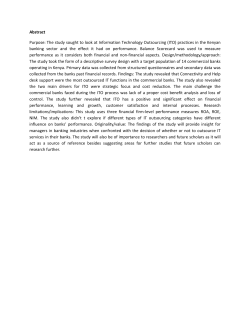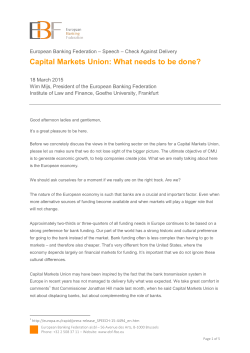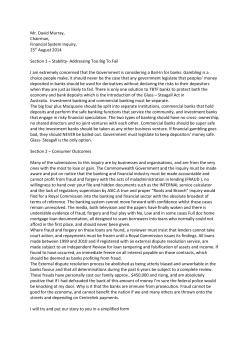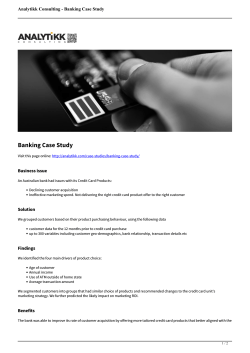
EuropEan Banking union - Constitutional Change through Euro
European Banking Union Democracy, Technocracy and the State of Integration Scientific Organisers: Pepper D. Culpepper, Stefan Grundmann, Adrienne Héritier, Hans-W. Micklitz European University Institute Sala Europa, Villa Schifanoia Via Boccaccio, 121 – Firenze 22-23 May 2015 ■ Context In 2012, at the height of the sovereign debt crisis, European decision makers decided that the next step in developing an ever closer union involved the formation of banking union (BU). Now that the banking union has taken shape, this conference will bring together social scientists from several disciplines to discuss the nature of the political processes that gave rise to the banking union. Which players were involved, and with what consequences, in the different stages of the decision-making process? To what extent has there been a trade-off between efficient problem solving, on the one hand, and democratic legitimation through an open political process, on the other? One important goal of the reform was to break the dangerous link between government debt and national banks buying government bonds to finance this debt. In June 2014 member states and the European Parliament decided to create a single resolution mechanism (SRM), the second building block of the BU, after the first step of the single supervision mechanism (SSM) had been introduced in 2013 to create a unified system to handle banks in crisis. The political decision-making that resulted in the two mechanisms involved difficult bargaining between governments with diverging preferences, particularly with respect to the mutual insurance of bank deposits in case of bank failure, but also as regards the distribution of decisionmaking competences under both the SSM and the SRM. Three conflicts of interest emerged: between debtor and creditor states; between member states favouring a centralization of competences and member states resisting centralization in the supervision and resolution; and between stakeholders of banks and of governments trying to protect the interests of taxpayers. Understanding how the institutional arrangements adopted reflect these tensions, and how these tensions are likely to influence the future functioning of the BU, is a central intellectual concern of the conference. A second major theme is the relationship between technocratic governance and democratic oversight. The SSM was introduced on the basis of a unanimity vote of member states. The European Parliament gave its support after it had been granted more powers than originally envisaged over the appointment of top officials at the new single supervisor and after obtaining better access to information from the ECB in its supervision of banks. In the case of the resolution of failing banks, the decision-process still significantly involves national decision-makers. Burden sharing in rescuing or resolving a failed bank has been watered down. While bail-in rules will first burden bond-holders with more costs of a failure, in a further step member governments will be financially responsible. The mutual rescue fund of 55 billion Euros is relatively small and will be built up over 8 years. The upshot of the modest SRM compromise is that the ECB is indirectly gaining more competences, because it is under more pressure to correctly assess banks balance sheets in the supervision of banks so that they can withstand another shock. The organization of the panels draws on the specific expertise of invited participants to shed light on these general issues at the intersection of law, politics, and economics. A first panel focuses on technocratic and centralized decision making in the BU, emphasizing the process and its particular constitutive element for the building of a new European banking union. The second session considers the inherent constitutional dimension of the project, comparing the BU as a step of constitutionalisation to the EU constitution building after the establishment of the competition order in the 1960s and 1970s. The two afternoon panels on Friday look into the overall systemic impact of the deepening of integration through the BU: what are the consequences for the overall institutional architecture of the EU, in particular as regards the democratic legitimation in the EU? The Saturday panel returns to how the political play of power in building the BU will influence its likely functioning, and the final roundtable takes two different disciplinary perspectives to anticipate the future functioning and potential dysfunctions of the banking union. ■ Programme Friday 22 May 09.00 – 09.30 Conference Registration and Coffee 09.30 – 09.45 Introduction and Welcome by Organizers 09.45 – 11.00 Technocratic and Centralised Decision-Making in Banking Union Niamh Moloney | London School of Economics Hans Micklitz | EUI Commentator: Adrienne Héritier | EUI 11.00 – 11.30 Coffee break 11.30 – 13.00 A Second Step of Integration through Constitutionalisation? From Competition to Banking Union Karel Lannoo | Centre for European Policy Studies Heike Schweitzer | Free University of Berlin Stefan Grundmann | EUI Commentator: Giorgio Monti | EUI 13.00 – 14.00 Lunch (Sala Bandiere) 14.00 – 15.15 Integration Without Democracy? Part I Sergio Fabbrini | LUISS Rome Christoph Möllers | Humboldt University Berlin Commentator: Philippe Schmitter | EUI 15.15 – 15.45 Coffee break 15.45 – 17.15 Integration Without Democracy? Part II Erik Jones | SAIS Europe, Johns Hopkins University Johannes Lindner | European Central Bank Commentator: Pepper Culpepper | EUI Cocktail and dinner (by invitation only) Saturday 23 May 10.00 – 12.00 Concluding Roundtable: The Banking Union in 2020 Armin von Bogdandy | Max Planck Institute for Comparative Public Law and International Law Heidelberg Martin Hellwig | Max Plank Institute for Research on Collective Goods Bonn Brigid Laffan | EUI 12.00 – 13.00 Lunch (Sala Bandiere) ■ Participants Pepper D. Culpepper European University Institute Sergio Fabbrini LUISS Rome Stefan Grundmann European University Institute Martin Hellwig Max Plank Institute for Research on Collective Goods Bonn Adrienne Héritier European University Institute Erik Jones SAIS Europe, Johns Hopkins University Brigid Laffan European University Institute Karel Lannoo Centre for European Policy Studies Johannes Lindner European Central Bank Hans-W.Micklitz European University Institute Christoph Möllers Humboldt University Berlin Niamh Moloney London School of Economics Giorgio Monti European University Institute Robert Rebhahn University of Vienna Philippe Schmitter European University Institute Heike Schweitzer Free University of Berlin Klaus Tuori University of Helsinki Armin von Bogdandy Max Planck Institute for Comparative Public Law and International Law Heidelberg
© Copyright 2025












